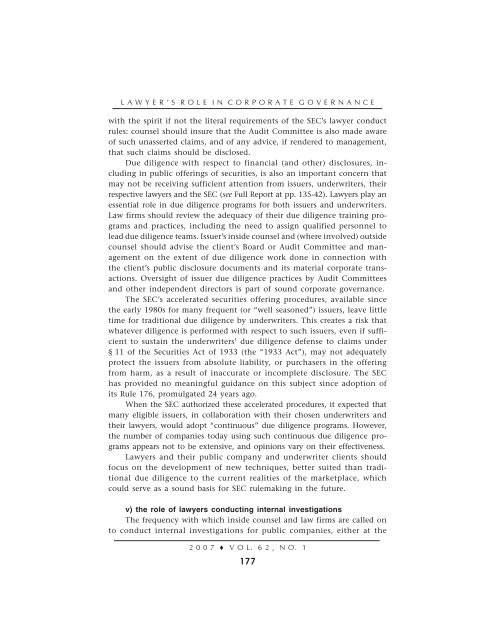2007 Issue 1 - New York City Bar Association
2007 Issue 1 - New York City Bar Association
2007 Issue 1 - New York City Bar Association
You also want an ePaper? Increase the reach of your titles
YUMPU automatically turns print PDFs into web optimized ePapers that Google loves.
L A W Y E R ’ S R O L E I N C O R P O R A T E G O V E R N A N C E<br />
with the spirit if not the literal requirements of the SEC’s lawyer conduct<br />
rules: counsel should insure that the Audit Committee is also made aware<br />
of such unasserted claims, and of any advice, if rendered to management,<br />
that such claims should be disclosed.<br />
Due diligence with respect to financial (and other) disclosures, including<br />
in public offerings of securities, is also an important concern that<br />
may not be receiving sufficient attention from issuers, underwriters, their<br />
respective lawyers and the SEC (see Full Report at pp. 135-42). Lawyers play an<br />
essential role in due diligence programs for both issuers and underwriters.<br />
Law firms should review the adequacy of their due diligence training programs<br />
and practices, including the need to assign qualified personnel to<br />
lead due diligence teams. <strong>Issue</strong>r’s inside counsel and (where involved) outside<br />
counsel should advise the client’s Board or Audit Committee and management<br />
on the extent of due diligence work done in connection with<br />
the client’s public disclosure documents and its material corporate transactions.<br />
Oversight of issuer due diligence practices by Audit Committees<br />
and other independent directors is part of sound corporate governance.<br />
The SEC’s accelerated securities offering procedures, available since<br />
the early 1980s for many frequent (or “well seasoned”) issuers, leave little<br />
time for traditional due diligence by underwriters. This creates a risk that<br />
whatever diligence is performed with respect to such issuers, even if sufficient<br />
to sustain the underwriters’ due diligence defense to claims under<br />
§ 11 of the Securities Act of 1933 (the “1933 Act”), may not adequately<br />
protect the issuers from absolute liability, or purchasers in the offering<br />
from harm, as a result of inaccurate or incomplete disclosure. The SEC<br />
has provided no meaningful guidance on this subject since adoption of<br />
its Rule 176, promulgated 24 years ago.<br />
When the SEC authorized these accelerated procedures, it expected that<br />
many eligible issuers, in collaboration with their chosen underwriters and<br />
their lawyers, would adopt “continuous” due diligence programs. However,<br />
the number of companies today using such continuous due diligence programs<br />
appears not to be extensive, and opinions vary on their effectiveness.<br />
Lawyers and their public company and underwriter clients should<br />
focus on the development of new techniques, better suited than traditional<br />
due diligence to the current realities of the marketplace, which<br />
could serve as a sound basis for SEC rulemaking in the future.<br />
v) the role of lawyers conducting internal investigations<br />
The frequency with which inside counsel and law firms are called on<br />
to conduct internal investigations for public companies, either at the<br />
2 0 0 7 V O L. 6 2 , N O. 1<br />
177

















